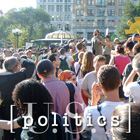
|
CITIZEN GOVERNMENT: HAVE YOUR SAY BEFORE CONGRESS VOTES MOVEMENT SEEKS TO FORCE CONGRESS TO PUBLISH ALL LEGISLATION BEFORE IT'S CALLED FOR FLOOR VOTE 2 March 2006 A major kink in the nation's legislative process, which has allowed for or even invited corruption of sometimes subtle sorts, is what lawmakers call "earmarking". It's the process whereby language is added to a bill with the specific purpose of directing specific funds to a given project or district. This process has allowed party leaders in both houses to shift massive amounts of government spending to their home districts. But the practice is not limited to leaders; committee chairs are able to use the process to direct funds to their home districts as well, as has been the case with highways legislation and the committee chair from a rural district in Pennsylvania. The fact that earmarking is often achieved through last-minute amendments not seen or read by most members of Congress means that lobbyists are naturally tempted to spend whatever amount necessary to be favored by such inclusions. And they often are. The Homeland Security Act originally included near total immunity for any drug company for deaths or ill effects related to any product, provided that the company had some tie to a military contract, as was the case with the manufacturer of a vaccine for anthrax, seen as a grave threat to national security throughout 2001 and 2002. It took some serious digging by members of the public, lobbyists against this practice and consumer interest groups to force Congress to change the language. But that sort of "amendment" is often placed on legislation that ostensibly has nothing to do with consumer or public health regulatory law, practices or enforcement. So, earmarking has meant the temptation to and the spread of systemic corruption in both houses of Congress. Recent years have seen lobbyists walking the floor of the people's house while voting was in process. In at least one case, a dissenting Republican complained of being threatened by leadership with withdrawal of funding if he did not vote in favor of the president's Medicare legislation. Lobbyists have reportedly offered deals to legislators that entailed moving a project to a given district in exchange for passage of earmarks favoring their commercial interests. Members of Congress have even included specific companies in legislation that was intended to serve the public interest, through regulatory provisions. The language of earmarking is complex and can become a misleading jargon. There's a severely unsavory term also used for the practice —"porkbarrel" spending— which actually has its roots in the slave-based economy of the old south, and which critics use to denigrate the earmarking process. There is also a tendency to refer to "special interests", a term widely misapplied to mean any group whose interests are not the normal functioning of the US government but include some particular aim, laudable or not. Of course, it is meant to mean interests of a certain kind, particularly if narrow in scope, so it's applicability to genuinely altruistic groups whose goals are not sectarian or partisan but the general wellbeing, is questionable. Earmarking has been central to the investigation into alleged bribery and corruption in Congress, involving indicted lobbyist Jack Abramoff. Members of Congress have repeatedly complained in recent years that they cannot and do not read much of the legislation that they are called to vote on, due to scheduling, printing and procedural "innovations" introduced by leadership. So, Readthebill.org is calling for the House of Representatives to pass a resolution that would require that all legislation be available in full online, in its final form, for at least 72 hours before Congress votes on its passage. The resolution, H.Res. 688, is sponsored by Rep. Brian Baird (D-WA). Citing Thomas Jefferson, who said "Whenever the people are well-informed, they can be trusted with their own government", the group aims to give the average American citizen a broader role in American government. The resolution would require that all bills be readable online, and would therefore invite the public to scrutinize legislation and respond to objectionable provisions; this could, in itself, limit the amount of frivolous or illegitimate earmarks members would be willing to place on any particular bill. [s]
|
||||||||||
|
|||||||||||








